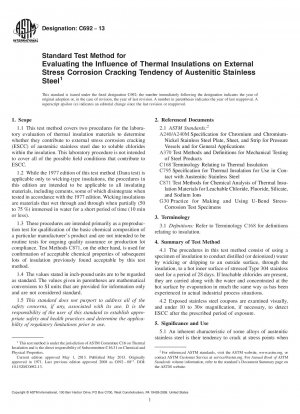ASTM C692-13
Standard Test Method for Evaluating the Influence of Thermal Insulations on External Stress Corrosion Cracking Tendency of Austenitic Stainless Steel
- Standard No.
- ASTM C692-13
- Release Date
- 2013
- Published By
- American Society for Testing and Materials (ASTM)
- Status
- Replace By
- ASTM C692-13(2018)
- Latest
- ASTM C692-13(2023)
- Scope
5.1 An inherent characteristic of some alloys of austenitic stainless steel is their tendency to crack at stress points when exposed to certain corrosive environments. The mechanisms of ESCC are complex and not completely understood but are apparently related to certain metallurgical properties. Chloride and fluoride ions have the potential to induce stress corrosion cracking in the absence of inhibiting ions.3
5.2 Chlorides are common to many environments, so great care shall be taken to protect austenitic stainless steel from chloride contamination.
5.3 Most thermal insulations will not, of themselves, cause stress corrosion cracking. Preproduction qualification tests are used to evaluate that under the conditions of the laboratory test that specific thermal insulation materials do not cause cracking of sensitized austenitic stainless steel. Insulation systems have the potential to act as collecting media by means of transmigration and concentration of corrosive ions on heated stainless steel surfaces. Exposure to elevated temperature results in evaporation of water and increased chemical reaction rates. Environments containing corrosive ions, moisture, and oxygen will increase the chance for stress corrosion cracking.
5.4 Insulation materials are available that are specially formulated to inhibit stress corrosion cracking in the presence of chlorides through modifications in basic composition or incorporation of certain chemical additives.
5.5 The ability of the 28-day test to measure the corrosion potential of insulation materials is documented by Karnes,4 whose data appear to have been used for construction of the acceptability curve used in Specification C795 and other specifications.
5.6 The metal for all of the coupons used in this test method (C692) shall be qualified (see Section 14) to ascertain that under conditions of the test, chloride ions will cause the metal to crack, and deionized water alone will not cause cracks.
1.1 This test method covers two procedures for the laboratory evaluation of thermal insulation materials to determine whether they contribute to external stress corrosion cracking (ESCC) of austenitic stainless steel due to soluble chlorides within the insulation. This laboratory procedure is not intended to cover all of the possible field conditions that contribute to ESCC.
1.2 While the 1977 edition of this test method (Dana test) is applicable only to wicking-type insulations, the procedures in this edition are intended to be applicable to all insulating materials, including cements, some of which disintegrate when tested in accordance with the 1977 edition. Wicking insulations are materials that wet through and through when partially (50 to 758201;%) immersed in water for a short period of time (10 min or less).
1.3 These procedures are intended primarily as a preproduction test for qualification of the basic ......
ASTM C692-13 Referenced Document
- ASTM A240/A240M Standard Specification for Chromium and Chromium-Nickel Stainless Steel Plate, Sheet, and Strip for Pressure Vessels and for General Applications
- ASTM A370 Standard Test Methods and Definitions for Mechanical Testing of Steel Products
- ASTM C168 Standard Terminology Relating to Thermal Insulation
- ASTM C795 Standard Specification for Thermal Insulation for Use in Contact with Austenitic Stainless Steel
- ASTM C871 Standard Test Methods for Chemical Analysis of Thermal Insulation Materials for Leachable Chloride, Fluoride, Silicate, and Sodium Ions
- ASTM G30 Standard Practice for Making and Using U-Bend Stress-Corrosion Test Specimens
ASTM C692-13 history
- 2023 ASTM C692-13(2023) Standard Test Method for Evaluating the Influence of Thermal Insulations on External Stress Corrosion Cracking Tendency of Austenitic Stainless Steel
- 2018 ASTM C692-13(2018) Standard Test Method for Evaluating the Influence of Thermal Insulations on External Stress Corrosion Cracking Tendency of Austenitic Stainless Steel
- 2013 ASTM C692-13 Standard Test Method for Evaluating the Influence of Thermal Insulations on External Stress Corrosion Cracking Tendency of Austenitic Stainless Steel
- 2008 ASTM C692-08e1 Standard Test Method for Evaluating the Influence of Thermal Insulations on External Stress Corrosion Cracking Tendency of Austenitic Stainless Steel
- 2008 ASTM C692-08 Standard Test Method for Evaluating the Influence of Thermal Insulations on External Stress Corrosion Cracking Tendency of Austenitic Stainless Steel
- 2006 ASTM C692-06 Standard Test Method for Evaluating the Influence of Thermal Insulations on External Stress Corrosion Cracking Tendency of Austenitic Stainless Steel
- 2005 ASTM C692-05 Standard Test Method for Evaluating the Influence of Thermal Insulations on External Stress Corrosion Cracking Tendency of Austenitic Stainless Steel
- 2000 ASTM C692-00 Standard Test Method for Evaluating the Influence of Thermal Insulations on External Stress Corrosion Cracking Tendency of Austenitic Stainless Steel

Copyright ©2024 All Rights Reserved